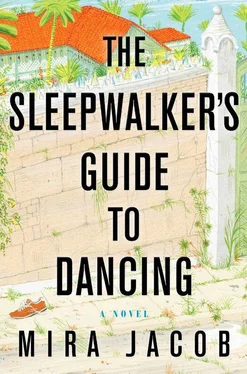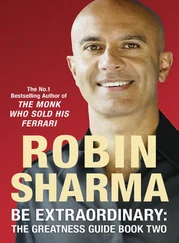“Hello,” he said, peering under it.
“Hey.”
She had been lying there since she had come home, looking at the picture she’d taken of Akhil on the couch the night of the fight over the keys and playing the reverse time game. It was a simple game; all it required was her imagining how far she would go back to change what had happened. How many days would she live over — minute by minute, not making any choices that would mess with the order of the universe the way they did in Star Trek —to change that one? Would she go back to seeing her parents fighting in the driveway over the summer? Easy. Back to Dimple on her first day home from camp? It wasn’t even a question. Back to breaking her arm in sixth grade, to being called a nigger by all the boys in her class in fourth? Harder. But yes. She was in third grade, during the class where she’d laughed so hard she accidently wet her pants, when Thomas had knocked.
“What are you doing?” he asked.
She shrugged.
He sat on the bed, the weight of him tilting it dramatically to one side. He was all knees and shoulders, too low to the floor. “How are you?”
“Fine.”
When she had done it all, when she had relived every moment without changing a thing, she would get to come back to that night. It was the best part of the game. That night, she would go through minute by minute, slowing everything down to remember exactly how it happened. She would talk to Akhil in his room. Go down to dinner. Eat the idlis and sambar. She would watch her father grow sad at the sink without interruption. She would know exactly when to go — after the fight, while Kamala and Akhil watched TV and Thomas cleaned the kitchen. She would do it perfectly, silently slinking out the back door, across the driveway. She would lower herself down under the car, letting the gravel dig into her knees. The air would be thick with the smell of tires and oil as her hand reached under the wheel hub, fingers searching until she felt the metal at their tips. She would empty the hide-a-key box.
Thomas’s eyes slid to the picture on her lap and then away. “I thought maybe you’d like to do something.”
“Like what?”
“Like go to a movie.”
“Tomorrow’s the last day of school.”
“Ah. Right. What if we go get dessert somewhere?”
“Dessert?”
“Yes. Heidi Pies. You like Heidi Pies, right?”
“I’m not hungry.” She saw his face drop and felt a pang of guilt. “Thanks anyway.”
Thomas opened his hands, read his palms as though there was a pamphlet resting on them. “You need to get up now.”
“What?”
“You can’t do this, koche .”
“Do what?”
“Amina.” He leaned over and squeezed her leg awkwardly. “I know you miss him. I miss him, too. We won’t … we won’t ever …” He cleared his throat. “But you cannot sit in bed for hours like this. It’s not right.”
“Me? Mom is the one who is in bed all day!”
“Mom will do what Mom wants to do. She will get up, too. Soon. But you are too young for this.”
“What about you? You’ve just been sitting around all night on your porch doing nothing but drinking scotch!”
“Not true.”
She glared at him.
“Drinking scotch, yes,” he corrected. “Doing nothing, no. I am very much doing something.”
“Yeah, right.”
“I’ll show you.” He stood up, banging his head on the canopy. He wiggled his fingers for her. “Come.”
Once she had emptied the hide-a-key box, Amina would let herself open her eyes. Akhil is in his room , she would think. And maybe a noise would happen, a hollow tap across the hall, the click of what could be the light going on in the bathroom, and her gut would shimmy and she’d think, I’ve done it. I’ve fucking done it. I’ve brought him back .
“Come with me,” her father said.

“What is it?”
“What does it look like?”
“A garbage bag.”
Thomas smiled. “Exactly. Except this one, I made.”
This was obvious from the pile of deflated garbage bags all over the porch.
Amina looked at him. “You’ve been making garbage bags?”
“Special garbage bags. Here, take it.” Thomas handed her the one he held in his hands.
She took it. It was not particularly special, except that he had cut slits in the top, and run a long piece of more garbage bag in and out of the slits.
“Wait.” He looked around the porch and grabbed a pile of newspaper, a soda can, a bottle. “Ready?”
She held the bag open and he dropped everything inside. She looked in after them. Nothing happened. She looked back at her father.
“Pull the ties!”
“What?”
“The things on the side! The handles!”
She held the bag away from her. Yes, there were long loops on either side. She pulled them, and the bag cinched at the top, the opening shrinking to a small O .
“You’ve made a garbage bag with handles?”
“I’ve made a garbage bag that closes easily! Ties shut! And then watch.” He motioned for the bag, and she handed it to him. “It’s a handle. So you can carry it. See?” He walked across the porch with a bit of jaunt to his step, the star of his own infomercial. He put the bag down and leaned back, hands on hips, like he was surveying the frontier ahead instead of just the screen door.
There was a moment, a longish moment, actually, where Amina imagined walking straight out of the house and down the dirt road to the main road, where she’d thumb a ride into town and show up at Raj and Sanji’s with a full suitcase and clear instructions to adopt her. She could become their daughter, their instant joy, the crucial part of a family that had suddenly expanded instead of contracted. Would she be happier in the long run? It was impossible to predict. But what Amina did know, what she was suddenly quite sure of, was that, unlike Raj and Sanji, her parents from this point on would need her to be more than she had ever been, and along with their need would come her inability to fill it. Even in her best moments, she could only be a reminder of what they had lost, the stain of her missing brother all but blotting out her own features, and really, what was it to be the object of affection for such permanently disfigured hearts? What would be left of her own shape? Then she realized that Thomas was looking at her with a face so full of hurt and hope that there was nothing to do but ask, “What else have you made?”
It was the beginning of something. The projects that she and her father would work on together, obviously, but also of Thomas’s return home. Not to the car, or the hospital for days on end, or even the porch, but the house, where he would eat dinner almost every night, or barring that, wake her up for an early breakfast. And though at first he asked too many questions about her schedule and interests and teachers, soon enough they settled into the work, remastering everyday objects into something new. They installed a heel-operated fan in a tennis shoe, created rubber grips for toothbrushes, and, inspired by sprayable cheese, tried to make an aerosol face cream.
When Kamala woke up, went to the mall, and found Jesus through the scalding proclamations of the Trinity Baptists, they built a receptacle to catch rainwater and funnel it into her garden. When she began to cook dinner again, they attached magnets to her most frequently used spices and stuck them to a metal sheet just next to the stove. When she turned the radio on to WEXD, Exodus in the Southwest, and stood on the kitchen table one Sunday morning, shouting, “He will rise again!” with desperate rapture on her face, they slipped into the fields, taking measurements of tree trunks to decide which might be most suitable for a family of hammocks.
Читать дальше













